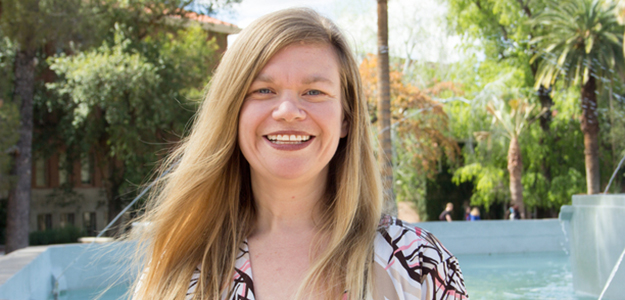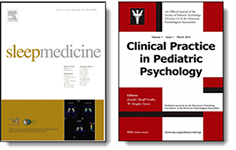
A team led by Michelle Perfect, PhD, a UA associate professor and associate program director in the School Psychology Program in the College of Education and a collaborator with the UA Health Sciences Center for Sleep & Circadian Sciences, has been awarded a $2 million grant to study the impact of sleep and daily routines on care for youths with Type 1 diabetes.
The five-year study will track daily routines such as sleep, diet, physical activity, school activity and diabetes management. It is being funded by the National Institutes of Health's National Institute of Diabetes and Digestive and Kidney Diseases (NIDDK). Researchers hope to determine if adjustments to routines for youths with Type 1 diabetes can improve regulation of their glucose levels and enhance daily management of the disease.
"The ultimate goal is to know what aspects of sleep or other parts of their daily routines — and how families work together in those routines — should be incorporated into standard diabetes care," said Perfect, pictured above right (Photo credit: Beatriz Verdugo/UANews) .
Current standards of care for people with Type 1 diabetes, she pointed out, do not include recommendations regarding sleep.
"Parental involvement is a big piece of this study," Perfect added. "We're looking at whether stabilizing routines, including activities throughout the day, those right before bed, and how much sleep they get, affects their diabetes control."
EXTRA INFO
Co-investigators in the study are: Mark Wheeler, MD, division chief of pediatric endocrinology and clinical professor of pediatrics in the UA Department of Pediatrics and the UA Steele Children's Research Center; Cindy Chin, MD, assistant professor of pediatrics in the UA Department of Pediatrics and the UA Steele Children's Research Center; Stuart Quan, MD, renowned sleep medicine expert, past chief of the UA Division of Pulmonary, Critical Care and Sleep Medicine (1987-2006) in the UA Department of Medicine, and a professor emeritus in the Arizona Respiratory Center at the UA College of Medicine; and Graciela Silva, PhD, MPH, clinical associate professor in the UA College of Nursing.To learn more, read two of the latest published papers on Dr. Perfect’s research, “Sleep characteristics in type 1 diabetes and associations with glycemic control: systematic review and meta-analysis” (Sleep Medicine, July 2016) and “Development of a Clinically Relevant Sleep Modification Protocol for Youth with Type 1 Diabetes” (Clinical Practice in Pediatric Psychology, June 2016).
Diabetes occurs when the pancreas produces too little or no insulin, which helps carry glucose to the body's cells. For those with Type 1 diabetes, the body no longer makes insulin because the body's immune system attacks and destroys the cells that make insulin. Over time, having too much glucose in the blood can cause health problems such as heart disease, nerve damage, eye problems and kidney disease.
Common treatments for Type 1 diabetes involve close monitoring of glucose levels and include insulin injections, making healthy food choices, being physically active, controlling blood pressure levels and controlling cholesterol levels.
A study by the National Center for Chronic Disease Prevention and Health Promotion estimated that, in 2012, more that than 200,000 people younger than age 20 in the U.S. had been diagnosed with Type 1 or Type 2 diabetes. The Centers for Disease Control and Prevention and the NIH also estimated that, in 2008 and 2009, more than 18,000 people in the same age group were newly diagnosed with Type 1 diabetes.
The UA grant proposal estimates that diabetes care costs $176 billion per year in the U.S.
Effective diabetes management "could reduce such costs and prevent the complications characteristic of this medical condition," the proposal stated. "From a biological perspective, glycemic control is more difficult due to hormonal changes during puberty. From a behavioral and social-cultural context, adherence to the prescribed self-care activities declines as burdens include interruptions of social activities, shifts in parental monitoring to autonomous self-care, and discomfort in multiple needle sticks."
The new study, scheduled to begin in January, will track 175 youths, who will participate for a maximum of 14 weeks. Groups will be staggered over the five-year period so that no more than 35 or 40 will participate at a given time.
"Dr. Perfect's work is such a wonderful example of innovative research that has the potential for impact across disciplines and across generations," said UA President Ann Weaver Hart, PhD. "The University is fortunate to have faculty members like her working at the intersection of medicine, psychology, human development and learning, and I look forward to the outcomes of this research."
Each participant will be paired with an interventionist, who will provide guidance and encouragement about how to set and follow daily routines.
For the first two weeks, a participant's natural routine will be tracked and recorded to establish a baseline. Based on the data gathered, a "prescription" for adjusting routines will be established and provided to the participant, and then tracked for the next month.
After a month, the interventionist will meet with the participant to examine and discuss the data gathered over the first month. The participant will be given tailored suggestions and troubleshooting ideas for the last two months of the study.
The UA already has conducted two smaller, preliminary studies focused on sleep. Indicators suggest that improved sleep patterns and extended sleep result in improved glucose levels and diabetes management. During the studies, only 10 percent of participants slept the recommended amount for their age.
While sleep is one of the major routines that will be examined and tracked in the new study, a participant's entire day will be tracked through diaries, questionnaires and monitors that will be worn by participants. The participants will be randomly selected for one of two study groups that will monitor different aspects of their daily routines.
"We've come to the conclusion that there are 24 hours in a day and we need to pay attention to that whole day," Perfect said. "We're not sure what's most important in how we emphasize it. Each of the two groups will emphasize different components of those routines throughout the day.
"The end goal is changing the standards of care to be more efficient and to reduce disease burden," Perfect said. "In Type 1 diabetes, they have to manage their diabetes all day. They have to test before they eat, estimate what they're going to eat, and give insulin for these factors. If they were to skip a medication dosage or make errors in how much insulin they give themselves, their blood glucose levels become too high or too low."
ALSO SEE:
“Photos, Video Available on DOM Research Seminars, PMI Town Hall, Sleep Center Open House” | POSTED: Dec. 9, 2016
“'Z-Factor' to Explore Sleep, Learning Link” | POSTED: Dec. 1, 2016
“Open House for the UA Health Sciences Center for Sleep & Circadian Sciences, Dec. 2” | POSTED: Dec. 1, 2016


